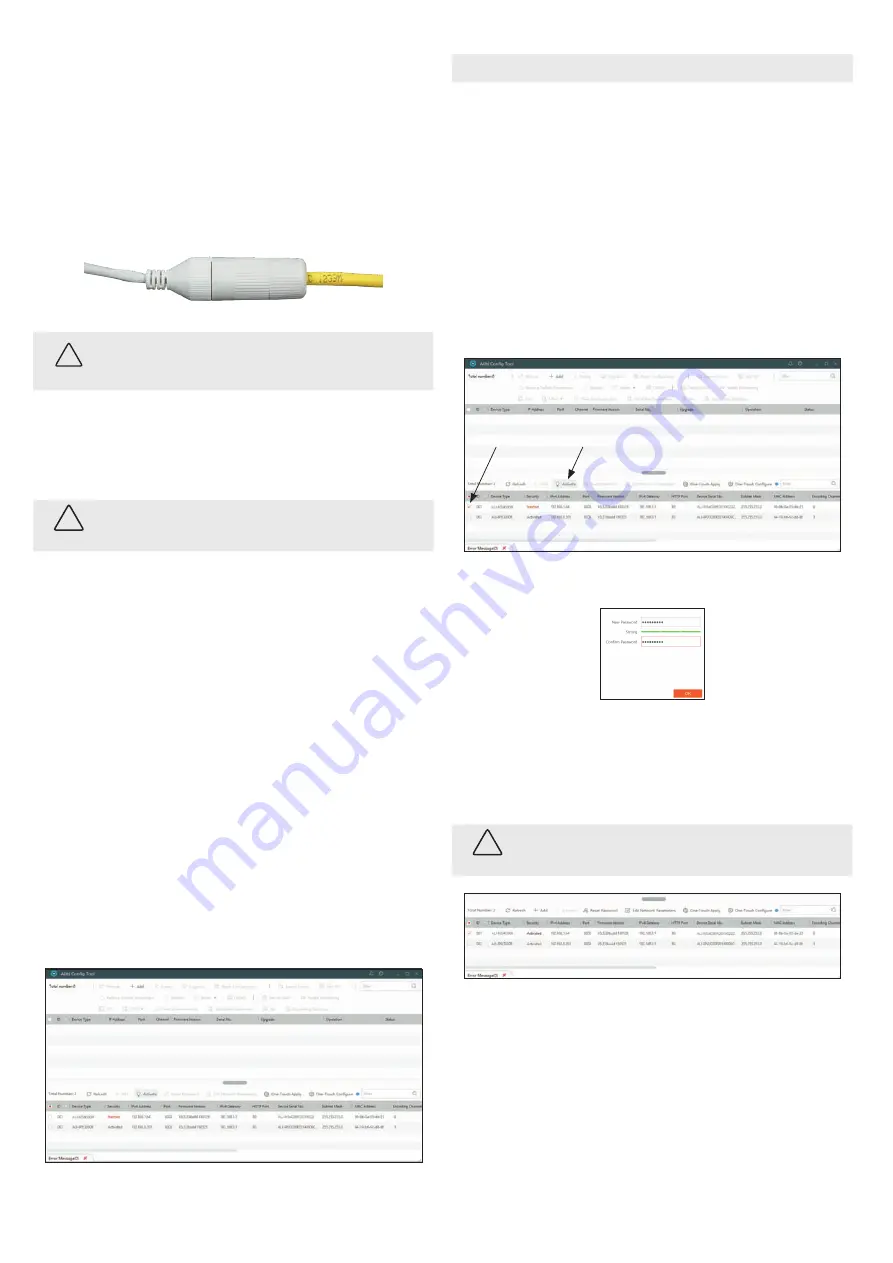
2
www.observint.com
2.
Using the template provided or the camera mounting base as a template, mark the locations of
the holes for the mounting screws. Also mark the location of a hole for the camera drop cables
if needed.
3.
Drill holes into the mounting surface as needed.
4.
Route extension cables from the LAN switch (or LAN with PoE) and powering source (if not using
PoE) to the mounting location.
5.
Connect the network LAN and power extension cables to the camera drop cables:
a.
Connect the Ethernet LAN cable to the camera LAN drop cable. Protect the connection
from moisture and other contamination, if necessary. A Weatherproof Ethernet Fitting is
provided. Installation instructions for the fitting are included later in this document.
Network drop cable
from camera
Network cable from
router or switch
Weatherproof Ethernet Fitting installed
WARNING
!
Failure of the Ethernet or power connectors due to moisture or another
contaminant is considered an installation error, which voids the warranty. If
installing this camera in a location such as an overhang, shop, garage, kitchen,
etc. where high humidity or dust is present, seal these connections adequately.
b.
If the camera will be powered using PoE, ensure that the plug on the power drop cable is
fully in place.
c.
If the camera will be powered through a 12 Vdc power extension cable, connect the
extension cable to the camera drop cable. The polarity of the drop cable connector is
shown in the drop cable photo above.
CAUTION
Do not apply power to the camera at this time. Before applying power to the camera, ensure
that the polarity is correct. An incorrect connection may cause a malfunction and can damage
the camera.
6.
For outdoor installations, seal holes drilled in the mounting surface to block moisture and other
contaminants, if necessary.
7.
Secure the camera to the mounting surface using the appropriate fasteners.
8.
Apply power to the camera through the 12 Vdc power cable or PoE injector, as configured.
Step 3. Install the Alibi Config Tool software
NOTE:
If the camera LAN extension cable is attached to a Network Video Recorder (NVR), skip this step.
The Alibi Config Tool is a PC-based network utility for discovery of Alibi compatible devices. It provides
an easy way to activate devices, configure camera and recorder network configuration settings, and set
device passwords. It can be installed on a Microsoft® Windows® operating system that has direct access
to the network where your Alibi devices are installed. You can download the Alibi Configuration Tool
from
AlibiSecurity.com/Resources
.
1.
Download the Alibi Config Tool from the
AlibiSecurity.com/Resources
website. At the time
when this document was published, the file is named:
alibi-config-tool.zip
and is about 80MB.
2.
Un-zip the file on a computer with Microsoft Windows (Windows 7 or newer) that is connected
to the LAN where your Alibi camera is connected.
3.
Run the file contained in the zip file:
Alibi Config Tool.exe
. Follow the on-screen instructions
to install the file.
4.
Open the Alibi Config Tool application. When the application opens, it automatically “discovers”
and lists all Alibi compatible devices on the LAN. See below.
NOTE
In the screen above, the tool can discover devices on other sub-nets. It will also list other Alibi
compatible devices on the LAN, and devices with the address 192.168.1.64 (an inactive Alibi device).
Step 4. Activate Inactive Alibi device
NOTE:
If the camera LAN extension cable is attached to a Network Video Recorder (NVR), skip this step.
Refer to the documentation available for your NVR firmware for the procedure to activate the camera, if
necessary.
When an Alibi device is first installed, or reset to its factory configuration, it must be “Activated” before
it can be used. In the Alibi Configuration Tool, “Inactive” devices have a
Security
status of
Inactive
,
and an IPv4 address of
192.168.1.64
. A device is “Activated” when a password is assigned to the
admin
username of the device.
In the example below, an ALI-NS4036R camera is activated and configured for its network. The
procedure is similar for all other Alibi network cameras currently available.
1.
Scan through the list of devices the Alibi Config Tool discovered for the Inactive device you want
to activate (see below). Click on the device in the list to highlight it, and then click the select box
to check it. See below.
Activate
Selected
2.
Click the
Activate
button. In the Activate window, you will create a password for the
admin
(administrator) username.
a.
In the Activate window, enter an a password for
admin
in the
New Password
field.
Include a combination of uppercase, lowercase alphabetic characters and numbers to
create a “Strong” password. The rating is shown beneath the Password field. See above.
b.
Enter the
admin
password again in the
Confirm
field, and then click
Activate
. In the
screen below, notice that the device Security status shows “Active”. Record your
admin
password for reference later.
CAUTION
If you lose your
admin
(administrator) password, you cannot configure the device or restore
it to its factory settings. To reset your password,
call
your support organization for specific
instructions.
Notice that although the device is now activated, it retained the default IP address.
Step 5. Edit Network Parameters
NOTE:
If the camera LAN extension cable is attached to a Network Video Recorder (NVR), skip this
step. The camera will receive network configuration settings from the NVR. Refer to the documentation
available for your NVR firmware for more information.
You can change the network parameters of devices that are active.
1.
In the list of devices discovered, click on the device you want to change the network settings for,
and then click the select box to check it. See below.
© 2019 Observint Technologies. All rights reserved.





